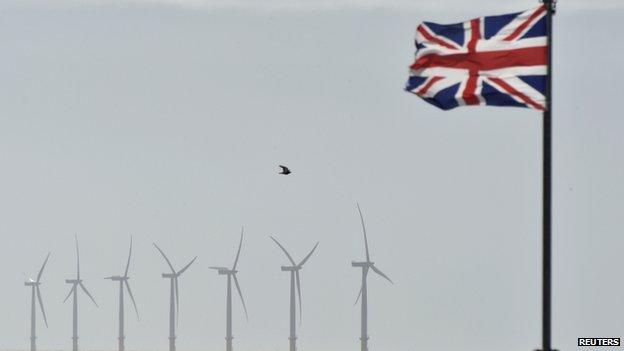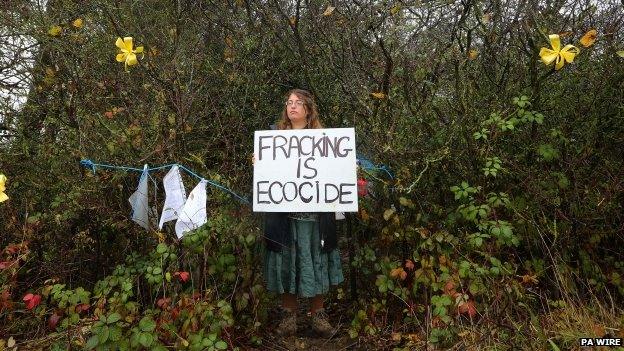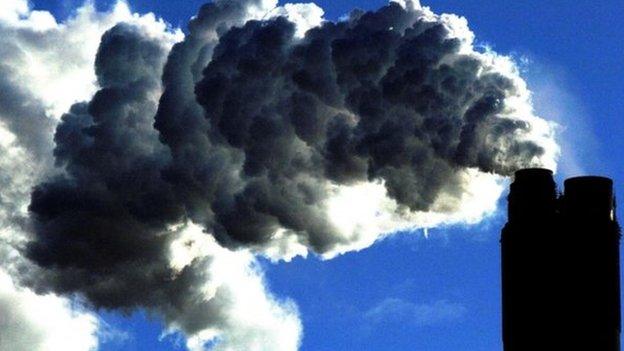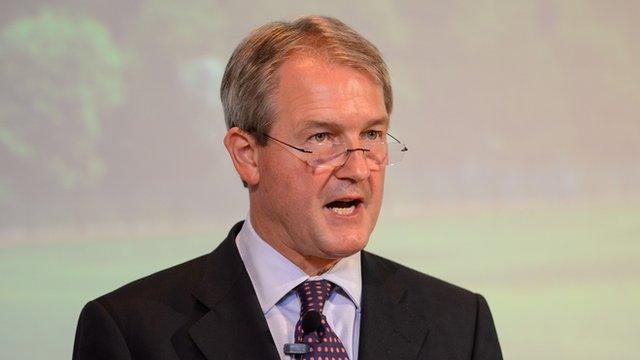Did Owen Paterson say anything truly startling?
- Published

The bid by former Environment Secretary Owen Paterson to reshape UK energy policy has delighted some, angered others, and left many puzzled because the government already supports several of his recommended policies.
His assertion that the UK's 2050 emissions targets are unlikely to be met with the current suite of technologies is a truth not widely spoken around government.
Opinion-formers in energy are generally concerned about climate change and don't often tell the public exactly how hard it will be to reduce emissions 80% on 1990 levels.
The need to replace gas in home heating will, for instance, be a monumental challenge at probably a very high price.
But of the specific policy proposals in Mr Paterson's lecture, several are being implemented anyway, at least in part, and others are speculative.
Take wind power. By calling for a halt to wind turbine development Mr Paterson will please many rural people. But the Local Government Secretary Eric Pickles is already blocking many new wind farms.
Fracking
Mr Paterson complains about the high cost of wind power and its huge subsidies - and indeed wind energy is much more expensive than gas at current prices.
But the government will phase out hand-outs to the wind industry, while keeping them for nuclear power - an energy source Mr Paterson supports.
He calls for mini-nuclear plants to be dotted round the country; but will they really prove more acceptable than windmills? What's more the mini-nukes are still at an early stage - we are unlikely to know for six years if the design will be licensed.
He wants government to do more to promote CHP - combined heat and power - in which waste heat from electricity generation is used to heat homes or drive industrial processes. He has won some support from academics and environmentalists who think the government has under-played its potential.
Mr Paterson pleaded for more energy efficiency, too - but the EU is trying to promote that anyway. He also wants demand management - in which consumers are incentivised to reduce power use at times of peak demand. The government is already supporting this for industry but Mr Paterson wants to go further.
He also put in a good word for fracking to extract gas from beneath the fields of Britain. But the government backs fracking too.

The government supports fracking - but its detractors are equally passionate
The biggest political impact from his speech could be his plea for the Climate Change Act to be suspended - and then repealed - unless other governments set similar targets. Some other MPs on the right of the Conservative Party share his view, so does UKIP. It's possible that the Conservatives might offer a manifesto promise to review the act.
But the government cannot amend the Act without taking into account the views of the independent Climate Change Committee as to whether the science of climate change has materially changed or whether other nations are not playing their part in reducing emissions. The committee recently said there was no good reason for the government to reject the agreed carbon "budget".
On the science of climate change, Mr Paterson's comments are interesting. He has dismissed fears about climate change in the past, and Defra rejected a Freedom of Information request from BBC News to see how many times he had been briefed on climate by his own chief scientist.
But he did admit that CO2 emissions could warm the atmosphere and that temperatures might rise again - and he rejected a chance to dismiss climate science altogether.
More controversially, he said in his speech that the climate had not warmed for 18 years. The slowdown in warming has surprised climate scientists but the official body, the IPCC, said surface warming over the past 15 years was still rising at the rate of 0.05 to 0.15C per decade - and that the planet as a whole was clearly warming if changes in the oceans were taken into account.
Will this unpredicted pause in warming allow politicians time to reassess the energy debate, as Mr Paterson suggests?
Many experts agree that the UK's 2013 Energy Act is a mess. It will guarantee subsidies for generators long into the future and force up bills.
But it took more than a decade of dithering to agree the act and current uncertainly over policy detail is deterring investment into UK energy infrastructure.
Mr Paterson's own colleagues in government have put a raft of policies in place to ensure that the lights won't go off and want to avoid uncertainty for that reason.
We can't be sure those measures will suffice, or that future energy prices will be acceptable to the public. But it is unlikely that government will create even more upheaval with the sort of whole-scale review Mr Paterson demands, in the short term at least.
- Published16 October 2014

- Published16 October 2014
